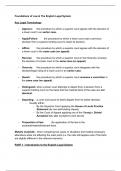-
1. Prüfung - Equity and trusts - remedies: personal and proprietary claims (exam plan)
-
2. Prüfung - Equity and trusts - family property (exam plan)
-
3. Prüfung - Equity and trusts - declaration of dispositions, transfer formalities, certainty of o...
-
4. Prüfung - Equity and trusts - trusts and insolvency (exam plan)
-
5. Prüfung - Equity and trusts - trustees and fiduciaries (exam plan)
-
6. Zusammenfassung - Criminal law - general principles (notes)
-
7. Zusammenfassung - Criminal law - assaults, consent, reasonable use of force, sexual offences, intoxicat...
-
8. Zusammenfassung - Criminal law - fatal offences: murder, voluntary manslaughter, constructive manslaugh...
-
9. Zusammenfassung - Criminal law - theft, fraud, robbery, and burglary (notes & exam guidance)
-
10. Zusammenfassung - Criminal law - accomplice liability and attempts (notes & exam guidance)
-
11. Prüfung - Contract law - contract formation: agreement and contractual intention (exam plan)
-
12. Prüfung - Contract law - contents of a contract: exemption clauses (exam plan)
-
13. Prüfung - Contract law - consideration & variation (exam plan)
-
14. Prüfung - Contract law - agency (exam plan)
-
15. Prüfung - Contract law - undue influence (exam plan)
-
16. Prüfung - Contract law - remedies for breach of contract (exam plan)
-
17. Prüfung - Contract law - frustration (exam plan)
-
18. Prüfung - Contract law - false preliminary statements: misrepresentation (exam plan)
-
19. Prüfung - Contract law - economic duress (exam plan)
-
20. Prüfung - Tort law - occupiers’ liability (exam plan)
-
21. Prüfung - Tort law - land (exam plan)
-
22. Prüfung - Tort law - negligence: duty, breach, causation, defences (exam plan)
-
23. Prüfung - Tort law - remedies in tort (exam plan)
-
24. Prüfung - Tort law - liability for defective products (exam plan)
-
25. Prüfung - Tort law - employers’ liability (exam plan)
-
26. Prüfung - Tort law - introduction to the law of tort: trespass to the person, defamation and th...
-
27. Prüfung - Tort law - economic loss and psychiatric harm (exam plan)
-
28. Prüfung - Land law - creation and enforceability of third party rights (exam plan)
-
29. Prüfung - Land law - leases (exam plan)
-
30. Prüfung - Land law - mortgages (exam plan)
-
31. Prüfung - Land law - fixtures and chattels (exam plan)
-
32. Prüfung - Land law - leasehold covenants (exam plan)
-
33. Prüfung - Land law - easements (exam plan)
-
34. Prüfung - Land law - trusts of land and co-ownership (exam plan)
-
35. Prüfung - Land law - freehold covenants (exam plan)
-
36. Zusammenfassung - Public law - the uk constitution: constitutional fundamentals and sources of the cons...
-
37. Zusammenfassung - Public law - parliamentary supremacy (notes)
-
38. Zusammenfassung - Public law - administrative law: the substantive grounds of judicial review & the pro...
-
39. Zusammenfassung - Public law - the rule of law and the separation of powers (notes)
-
40. Zusammenfassung - Public law - key rights and freedoms (notes)
-
41. Zusammenfassung - Eu law - competition law (notes & exam guidance)
-
42. Zusammenfassung - Eu law - the fundamental freedoms: free movement in the single market (notes & exam g...
-
43. Zusammenfassung - Eu law - enforcing eu rights (notes & exam guidance)
-
44. Zusammenfassung - Foundations of law & the english legal system
-
Mehr anzeigen




